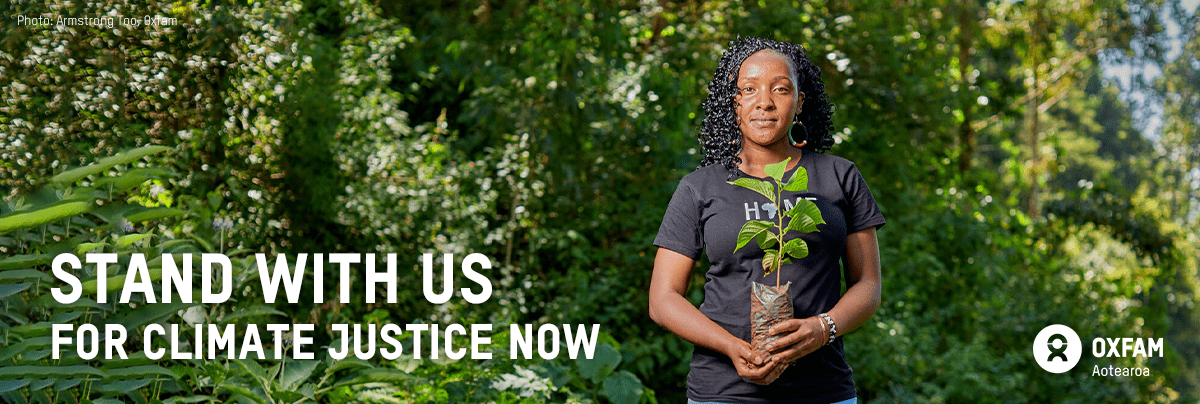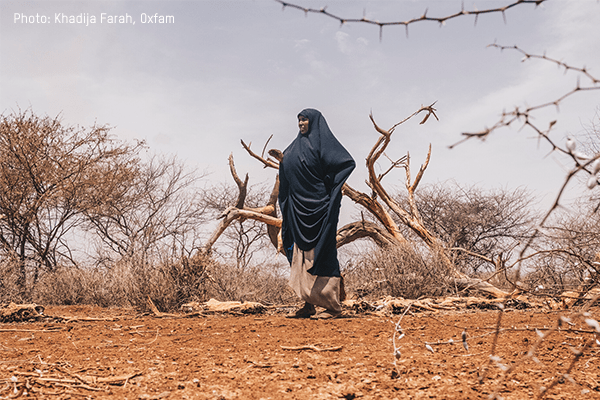
Get frontline communities the loss and damage finance they need
It started with children planting trees. Thousands of them. In Kenya, Elizabeth Wathuti set up an initiative encouraging young children to love nature and be environmentally conscious. Now, Elizabeth is demanding justice for the people whose lives and livelihoods are threatened by climate breakdown. She is hoping to influence the most powerful people as they choose whether to do what’s easy or what’s right.
As many as 28 million people across East Africa are at risk of extreme hunger if rains fail again. Kenya has suffered a 70 percent drop in crop production and has declared a national disaster with 3.1 million people in acute hunger, now in need of aid. We cannot ignore the huge economic and non-economic damages that the climate crisis is causing.
But in the UN climate negotiations, rich countries including New Zealand, have fiercely resisted progress at every turn. This inaction continues despite calls going back 30 years for a global fund to support recovery from damages caused by climate change.
Elizabeth is calling on leaders to act now by delivering a dedicated finance facility to help frontline communities deal with the loss and damage they are already experiencing – and which we know will only get worse¹. This letter will be delivered to those in charge of negotiations at the UN Climate Talks later this year.
Scroll down to read Elizabeth’s full letter and add your name to demand climate justice now.

Diyaara stands among the carcasses of her family’s livestock. Kenya, Somalia, and Ethiopia are experiencing the driest conditions in 40 years with as many as 28 million people across East Africa facing severe hunger.
Elizabeth’s open letter:
Dear Minister Sharma and Minister Shoukry,
You are jointly responsible for guiding the UN climate change negotiations at what is a watershed moment in human history.
I urge you to meet this challenge with compassion and courageous leadership, which is what will be needed to keep the 1.5°C temperature goal of the Paris Agreement alive.
The loss and damage already being experienced by communities on the frontlines of the climate crisis is being cruelly compounded by the impacts of a war and global pandemic.
People who have contributed least to the climate crisis are right now suffering its worst impacts, and decency demands that finance be mobilised urgently through a loss and damage facility to help them.
This year I have been spending time understanding the lived experience of these frontline communities.
Recently, I visited Wajir County, which is about a day’s drive northeast of my home in Nairobi, Kenya.
What I witnessed there was a deeply shocking example of the suffering that the interconnected climate, nature and food crises are bringing to bear right now across the African continent.
Four consecutive failed rainy seasons have led to terrifying levels of food and water insecurity across the region.
I saw with my own eyes the terrible suffering that the community in Wajir is experiencing and the stories that local people had to share will never leave me.
Most people in Wajir depend on livestock for their livelihood, but thousands of their animals are now dropping dead of thirst and starvation.
Young girls are being pulled out of school because their families can no longer afford to pay school fees.
Babies are failing to thrive because their hungry mothers’ can’t produce enough milk to feed them.
Relentless drought has completely decimated local wildlife populations.
And natural ecosystems that should be a life source for all have been pushed beyond breaking point.
What hit me hardest, though, was to hear that some of the people I met feel hopeless about their situation – that only their faith now keeps them going as they pray to God for the rains to arrive.
Most of the people I met in Wajir do not know that decisions made in far away places might have something to do with the situation they are facing.
What would they do if they knew that the actions of others – rich, high-emitting nations in the global north – had something to do with their predicament?
Would they simply pray to God for the rains to come, or would they have something to say to world leaders and big companies who are increasing the likelihood and intensity of these kinds of disasters?
Communities on the frontline of the climate crisis, like the people I met in Wajir, are not responsible for causing the climate crisis – but they are suffering its impacts right now, well beyond what they can adapt to.
The global community must not simply abandon them to their fate.
Which is why it is critical that the COP27 climate change talks, to be held in Egypt later this year, deliver a dedicated finance facility to help frontline communities deal with the loss and damage they are already experiencing – and which we know will only get worse.
This is not just about money – because money can never replace what the people I met in Wajir have already lost.
This is about justice.
It is about building trust and solidarity.
This is what the global community needs if we are to solve the nature and climate crises together.
Yours sincerely
Elizabeth Wathuti





